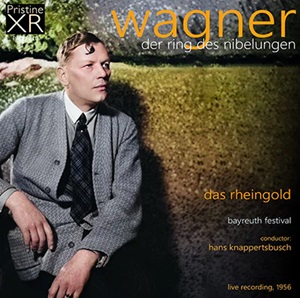
Richard Wagner (1813-1883)
Das Rheingold
Wotan – Hans Hotter (bass-baritone)
Alberich – Gustav Neidlinger (bass-baritone)
Mime – Paul Kuen (tenor)
Fasolt – Josef Greindl (bass)
Fricka – Georgine von Milinkovič (mezzo-soprano)
Chorus and Orchestra of the Bayreuther Festspiele/Hans Knappertsbusch
rec. live, 13 August, 1956, Bayreuth
Reviewed as 24-bit FLAC download
Knappertsbusch The 1956 Wagner Ring Vol. 1
Pristine Audio PACO 210 [2 CDs: 158]
For those like me who were brought up on Solti’s studio Ring, the prospect of hearing one by Knappertsbusch is the stuff of legend. In his book on recording the Ring, the producer John Culshaw, who was planning a studio Ring, explained why he did not do so with Kna: ‘I knew by then that he could not produce in the studio the remotest ghost of what had been the greatest theatrical experience of my life.’ Not being a close follower of live opera recordings, I had not known that live performances of the Ring from Kna were available, and this Rheingold and its successor operas come from the 1956 cycle. Having recently listened through again to Solti’s Ring, I have had that in mind for a comparison.
Presumably the source material was the radio recording, but Andrew Rose of Pristine Audio has worked his magic on it, so that it is now available in ambient stereo and the sound is full, rich and clear. It does, however, very much favour the voices. The orchestra at Bayreuth plays in a sunken pit, while it seems that the microphone or microphones were placed quite high up. This is fine for the voices, but it does mean that a good deal of the instrumental detail comes over far too softly. This is even true of the brass. The first statements of the gold motif on the horn are inaudible. A test passage is the descent into Nibelheim between the second and third scenes. The strings build up the hammering motif to a great climax and then the theme associated with love rejected cuts through the texture, first on trumpets and then on trombones, and descends to the depths. Here, the brass theme can barely be heard. Then the anvils come in and take over. Culshaw and Solti took pains to follow Wagner’s directions precisely, using eighteen anvils in three different sizes and realizing their notated clanking exactly. Here the sound is crude and overloud so that you do not hear the orchestra when it comes back in. Solti’s version here is incomparably superior. Similarly, at the end of the opera, the rainbow bridge theme does not dominate the texture as it should.
However, honours are more even when it comes to the singers, partly because Solti uses some of the same ones. Neidlinger’s Alberich and Kuen’s Mime are just as effective as on the Solti set. It is a particular pleasure to hear Hotter as Wotan; Solti, somewhat controversially, cast George London as the Rheingold Wotan but reverted to Hotter, then coming to the end of his career, for the Walküre Wotan and the Siegfried Wanderer. Hotter is in excellent voice with barely a trace of the wobble which could afflict him later, and his phrasing and projection of the text is superior to London, good though he is. Of the other gods, I would particularly note Suthaus’s Loge. I don’t think he really has the right voice for the role, as he was a Heldentenor who also sang Siegfried, while Loge is a character role, but he is suitably cunning and expressive.
The women are good too. The trio of Rhinemaidens is absolutely delightful. Gré Brouwenstijn manages to make something of the tiny part of Freia, while Jean Madeira is as suitably solemn and impressive as Erda as she is for Solti. Solti famously managed to secure Kirsten Flagstad, the leading Brünnhilde of the previous period, to come out of retirement to sing Fricka, but Georgine von Milinkovič also does a fine job.
Kna’s pacing is surprisingly similar to Solti, so much so that I wonder whether Solti had been to Bayreuth to hear one of his performances to help prepare his own. However, he goes for the long line, whereas Solti takes every opportunity to build up climaxes. The balance problems I put down to the recording engineers, not to Kna. Despite my reservations, this is a rewarding set, and fans of the singers, in particular, will be pleased. A further advantage to this set is that purchase through the Pristine Audio website brings as well downloadable access to a full score, a vocal score, a libretto (in German) as PDFs and an MP3 file of the recording.
Stephen Barber
Previous review Ralph Moore (April 2024)
Availability: Pristine ClassicalOther Cast
Donner – Alfons Herwig (baritone)
Froh – Josef Traxel (tenor)
Loge – Ludwig Suthaus (tenor)
Fafner – Arnold van Mill (bass)
Freia – Gré Brouwenstijn (soprano)
Erda – Jean Madeira (contralto)
Woglinde – Lore Wissmann (soprano)
Wellgunde – Paula Lenchner (soprano)
Floßhilde – Maria von Ilosvay (contralto)


















